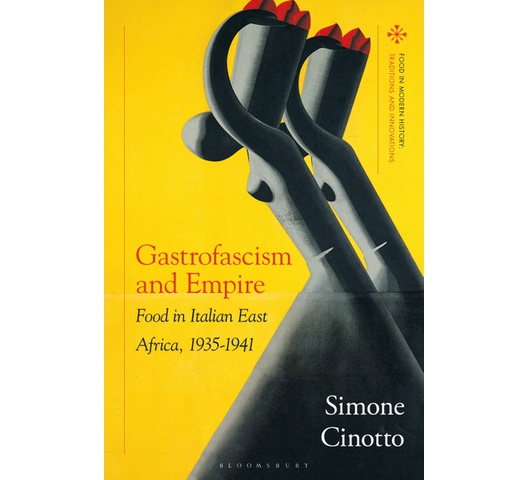
Gastrofascism and Empire
This is an eBook that you can download electronically.
Food stood at the centre of Mussolini's attempt to occupy Ethiopia and build an Italian Empire in East Africa. Seeking to redirect the surplus of Italian rural labor from migration overseas to its own Empire, the fascist regime envisioned transforming Ethiopia into Italy's granary to establish self-sufficiency, demographic expansion and strengthen Italy's international political position. While these plans failed, the extensive food exchanges and culinary hybridizations between Ethiopian and Italian food cultures thrived, and resulted in the creation of an Ethiopian-Italian cuisine, a taste of Empire at the margins.
In studying food in short-lived Italian East Africa, Gastrofascism and Empire breaks significant new ground in our understanding of the workings of empire in the circulation of bodies, foodways, and global practices of dependence and colonialism, as well as the decolonizing practices of indigenous food and African anticolonial resistance. In East Africa, Fascist Italy brought older imperial models of global food to a hypermodern level in all its political, technoscientific, environmental, and nutritional aspects. This larger story of food sovereignty-entered in racist, mass settler colonialism-is dramatically different from the plantation and trade colonialisms of other empires and has never been comprehensively told.
Using an original decolonizing food studies approach and an unprecedented variety of unexplored Ethiopian and Italian sources, Cinotto describes the different meanings of different foods for different people at different points of the imperial food chain. Exploring the subjectivities, agencies and emotions of Ethiopian and Italian men and women, it goes beyond simple colonizer/colonized binaries and offers a nuanced picture of lived, multisensorial experiences with food and empire.
SKU: 9781350436855
Format: EPUB
In studying food in short-lived Italian East Africa, Gastrofascism and Empire breaks significant new ground in our understanding of the workings of empire in the circulation of bodies, foodways, and global practices of dependence and colonialism, as well as the decolonizing practices of indigenous food and African anticolonial resistance. In East Africa, Fascist Italy brought older imperial models of global food to a hypermodern level in all its political, technoscientific, environmental, and nutritional aspects. This larger story of food sovereignty-entered in racist, mass settler colonialism-is dramatically different from the plantation and trade colonialisms of other empires and has never been comprehensively told.
Using an original decolonizing food studies approach and an unprecedented variety of unexplored Ethiopian and Italian sources, Cinotto describes the different meanings of different foods for different people at different points of the imperial food chain. Exploring the subjectivities, agencies and emotions of Ethiopian and Italian men and women, it goes beyond simple colonizer/colonized binaries and offers a nuanced picture of lived, multisensorial experiences with food and empire.
KES 15,467

International delivery
Free click & collect
When you buy an ebook from TBC, you will be given a code to download your
purchase from our ebook partner Snapplify. After you have redeemed the code and
associated it with a Snapplify account, you'll need to download the Snapplify Reader
to read your ebooks. The free Snapplify Reader app works across iOS, Android,
Chrome OS, Windows and macOS; on tablets and mobile devices, as well as on
desktop PCs and Apple Macs.
You're currently browsing Text Book Centre's digital books site. To browse our range of physical books as well as a wide selection of stationery, art supplies, electronics and more, visit our main site at textbookcentre.com!
Reviews
This product does not have any reviews yet.
Add your review
